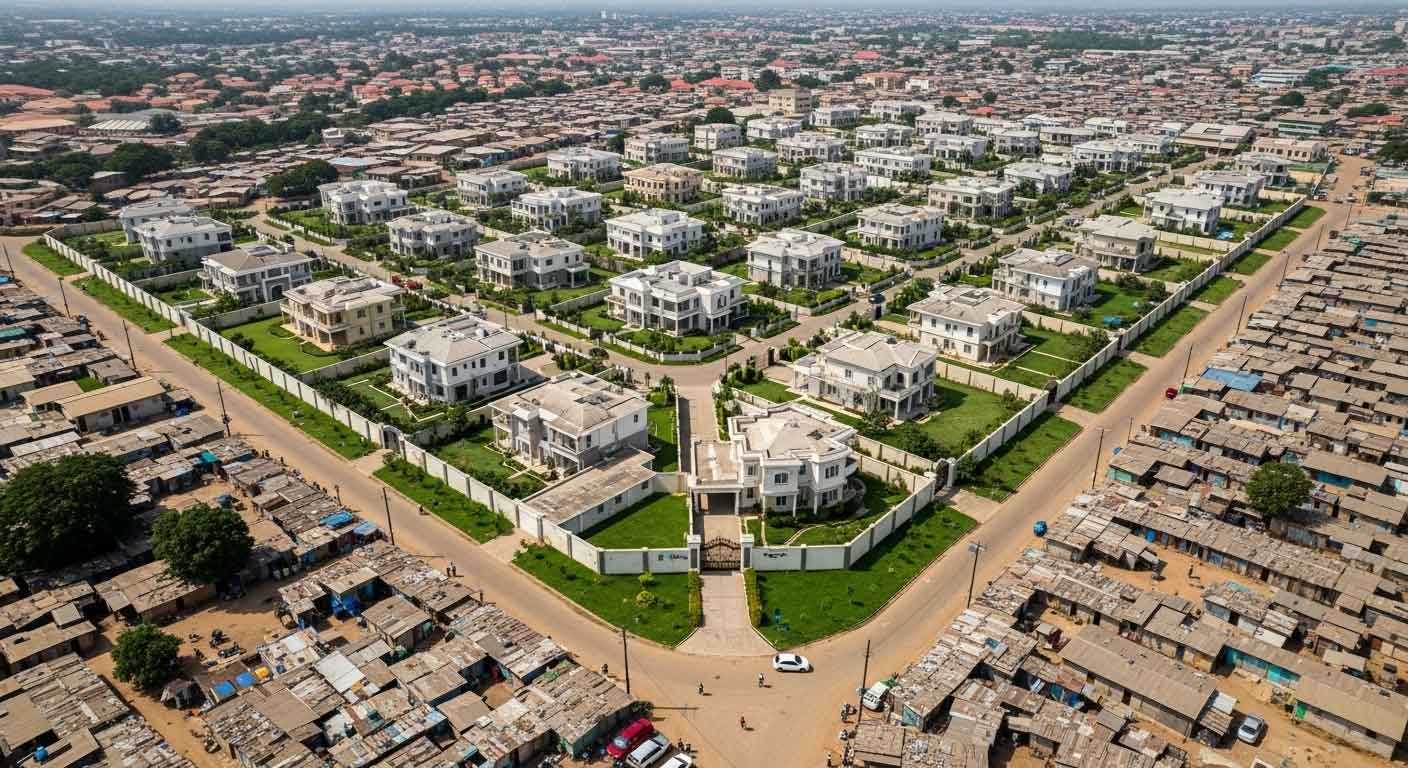Introduction: A Dual-Speed Market
While Accra’s skyline glistens with glass towers and smart condos, millions of Ghanaians still struggle with an uncomfortable truth: housing is becoming a luxury many cannot afford. Ghana faces an estimated housing deficit of over 2 million units, and the gap between high-end supply and grassroots demand continues to widen.
2025 presents both a sobering reminder of systemic inequality and a window of opportunity for visionary reform, technological disruption, and inclusive development.
The Crisis in Context: When Shelter Becomes Scarce
In the bustling hearts of cities like Accra, Kumasi, and Takoradi, land prices soar, rents outpace salaries, and home ownership remains a distant dream for middle- and low-income earners. Factors compounding the crisis include:
- High construction costs due to inflation and currency depreciation.
- Interest rates averaging over 30%, making mortgages inaccessible to the average Ghanaian.
- Complex land tenure systems, discouraging small-scale developers and raising risks for buyers.
- Urban migration, with projections that 70% of Ghanaians will live in cities by 2030, swelling demand for urban housing.
In 2025, affordable housing is not just a development issue—it is a national emergency.
Why the Market Isn’t Solving Itself
Most developers have gravitated toward luxury or mid-tier housing due to higher margins and lower operational risks. The financial math simply doesn’t work for affordability: developers struggle to build homes under $50,000 while still making a profit, especially when material costs are rising and infrastructure support is thin.
Government-led initiatives have often lacked speed, scale, or transparency, leaving the private sector without a stable partner for long-term solutions.
Emerging Innovations: Glimpses of Hope
Despite the inertia, 2025 is seeing sparks of innovation:
1. Modular and Prefabricated Construction
Startups and forward-thinking developers are experimenting with precast materials and modular homes to slash costs and build time. These methods reduce reliance on imported cement and allow for on-site assembly in record time—lowering prices without compromising structural integrity.
2. Public-Private Partnerships (PPPs)
Collaborations between government bodies and private developers are showing early success. One notable shift is the government’s digitization of land records, making it easier to identify, allocate, and develop plots for affordable housing projects.
Developers who once avoided the affordable market are now re-engaging—with government incentives acting as the missing link.
3. Micro-Mortgages and FinTech Integration
FinTech platforms are offering micro-mortgage models, installment payments, and savings-linked credit—breaking down the rigid financing barriers that once excluded everyday Ghanaians from homeownership.
These tools are also giving informal workers—previously invisible to banks—a path to creditworthiness and eventual property ownership.
4. New Locations, New Thinking
Some developers are expanding their footprints beyond central Accra into peri-urban zones along emerging corridors like the N4 (Pantang, Oyibi). Projects like Trasacco Park offer homes starting at $52,000 with flexible payment terms and planned green environments, illustrating that affordability and dignity can co-exist.
The Cultural Shift: From Survival to Dignity
Housing isn’t just about shelter—it’s about stability, safety, and self-worth. Without a place to live, families can’t access quality education, healthcare, or employment. Yet, when built right, affordable housing unlocks economic mobility, reduces slum proliferation, and improves mental health outcomes.
2025’s discourse is slowly shifting from “how many units” to “how are we enabling dignity?”
The Call to Action: Who Will Lead?
The affordable housing crisis requires more than good intentions. It needs:
- Governance that incentivizes, regulates, and partners with agility.
- Developers willing to trade short-term profits for long-term impact.
- Technologists and architects committed to frugal innovation.
- Investors and diaspora looking beyond luxury yields into nation-building.
Conclusion: Building for the Many, Not the Few
Ghana’s housing future will not be judged by the height of its towers but by how well its cities house its people. Luxury may capture headlines, but affordability determines stability. In 2025, the country stands at a crossroads—one path leads to exclusivity, the other to inclusion.
The question is no longer “Can we build affordable housing?” but rather:
“Will we choose to?”





